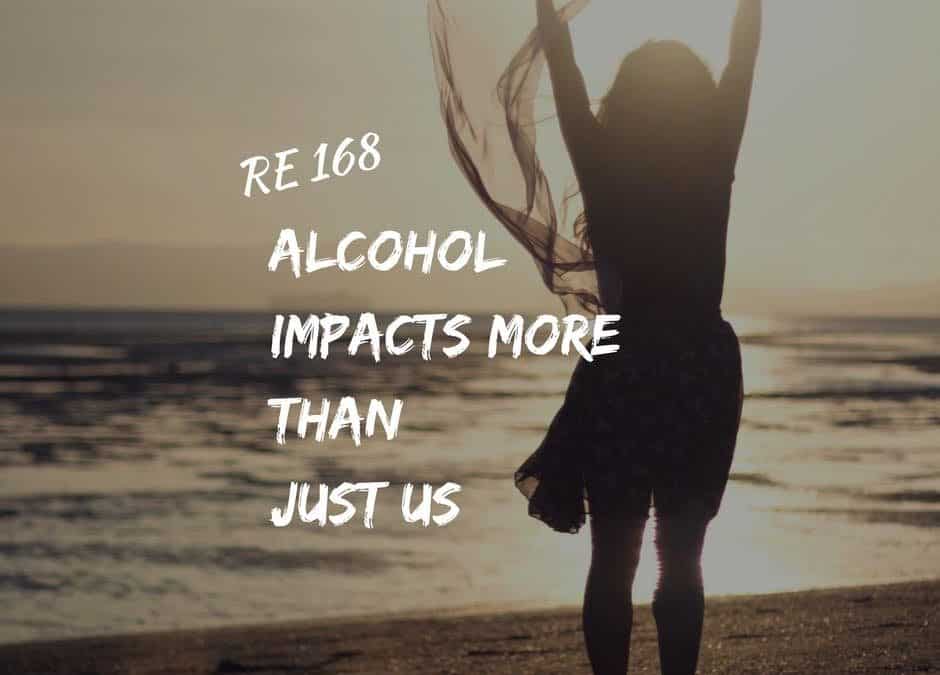
by Paul Churchill | May 7, 2018 | Podcast
Podcast: Play in new window | Download
Subscribe to the Recovery Elevator Podcast Apple Podcasts | | More
When we are in the throws of an addiction to alcohol, the effects go beyond just us. They affect our family and those closest to us.
After running the podcast for 3 years, Paul has begun to notice patterns emerging. One of the biggest patterns he noticed might be the key to successful sobriety: Accountability. Getting sober can be daunting, and the people around you are owed an explanation. The act of saying it out loud not only makes it real, but makes others aware of what you are trying to achieve. They can help keep you on track when things get difficult, and if your drinking has hurt anyone else in the past, it can be the first step towards forgiveness.
Telling the people in your life that you are trying to get and stay sober is probably the most important thing you can do to affect your chances of success.
Amy, with 422 days since her last drink, shares her story…
SHOW NOTES
[9:30] Paul Introduces Amy.
Amy is 33 years old, from Wisconsin, married with 3 kids. She works in human resources in healthcare, but is about to leave her job and focus on her family full time. She likes yoga, and the outdoors.
[12:00] What are your plans now that you are sober?
She wants to get more involved in her community.
[13:00] When did you realize it was time to quit drinking?
She was having a hard time moderating, was losing control.
[13:33] What rules did you have in place during your moderating phase?
She and her husband tried only drinking on weekends, only when at restaurants, only certain kinds of drinks, only on payday, etc. It didn’t work.
[16:30] Is your husband supportive of your decision to get sober?
Yes. He helps by not drinking around her and by keeping alcohol out of the house.
[17:07] When did you start drinking?
In high school. It got out of control in college. She adopted a party girl personality. She was drinking 4 beers a night. It progressed into a problem once she went through her first divorce. She felt hopeless and used alcohol to cope.
[21:57] How did you decide to quit?
She was drinking daily, feeling terrible. Some good things began to happen and she felt that it lifted her out of her funk. She got a new job, which enabled her to pay down her debt and she started taking care of herself again. She fell in love. The drinking was still crazy and she couldn’t control it. She tried to take a break, but it wouldn’t work. She was writing a lot in her journal, then went on an 8-day binge. She woke up from that and had hit rock bottom. She decided to quit on that day.. the difference was that she was ready to accept her situation.
[27:30] What was it like to reach the point of acceptance?
It was liberating. Acceptance brought self forgiveness, which enabled her to start moving forward in a new way.
[31:30] How did you do it? How did you quit?
She started to binge listen to recovery podcasts, she read This Naked Mind. She focused on being kind to herself. She reached out to sober friends and family. Connecting with close relatives and friends helped boost her confidence. They helped her get through the first few weeks. She began to see the bigger consequences of drinking on her health, career, relationships. Her husband supported her fully.
[34:37] At what point did you begin to see the benefits?
Day 2. The first few weeks there were headaches, sleep issues, etc. She experienced the pink cloud. She found out she was pregnant the month she quit drinking. She started looking at the bigger picture. She experienced normal activities as a sober person and was amazed at the difference.
[39:46] What’s on your bucket list?
She’s excited to be a stay-at-home mother soon. Many of her friends are reaching out to her in support of her sobriety.
[42:33] Rapid Fire Round
- What was your worst memory from drinking?Going to a concert and getting drunk, getting into a fight and walking around completely blacked out.
- Did you ever have an “oh-shit” moment?She woke up one day with a damaged car but didn’t remember what caused it.
- What’s your plan moving forward?To really stay active in her community. To focus on her family. To meditate more. To exercise. Hang out with the family. Reading in the evening to wind down.
- What’s your favorite resource in recovery?
- What’s the best advice you’ve ever received (on sobriety)?Put your sobriety first. Before kids, marriage, career.
- What parting piece of guidance can you give listeners who are in recovery or thinking about quitting drinking?Educate yourself about alcoholism. The truth will give you the confidence to go forward knowing what you have to do. Life is too short to be drunk.
- You might be an alcoholic if…You fear being a stay at home because you assume you will be drunk the whole time.
Resources mentioned in this episode:
Today’s podast episode is brought to you by Zip Recruiter and Casper.
Try Zip Recruiter today for free.
Get $50 off select mattresses by visiting Casper and us the promo code Elevator
This Naked Mind – A book by Annie Grace
In the Realm of Hungry Ghosts – A book by Gabor Maté
Connect with Cafe RE– Use the promo code Elevator for your first month free
Sobriety Tracker iTunes
Sobriety Tracker Android
Sober Selfies! – Send your Sober Selfie and your Success Story to info@recoveryelevator.com
“We took the elevator down, we gotta take the stairs back up, we can do this!”
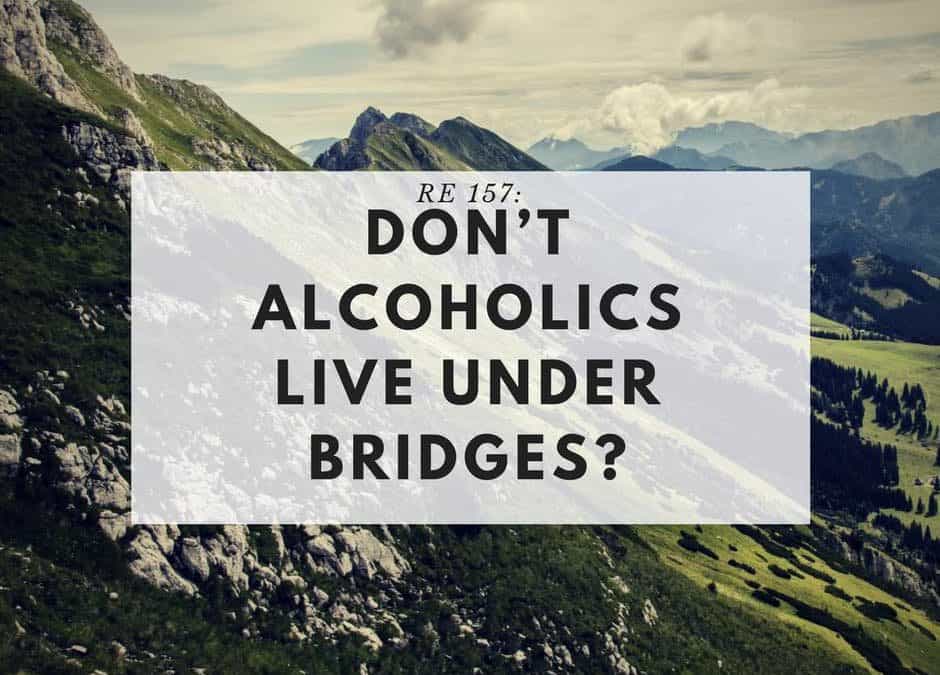
by Paul Churchill | Feb 19, 2018 | Podcast
Podcast: Play in new window | Download
Subscribe to the Recovery Elevator Podcast Apple Podcasts | | More
Many of the stereotypes surrounding alcoholism don’t match up with reality. The image of the homeless guy holding the bottle in a brown paper bag and living under a bridge doesn’t correctly represent the average alcoholic, despite the image’s popularity. Recent data shows that only 3-5% of alcoholics are homeless or on the street.
As a group, alcoholics have enhanced dopamine receptors. They tend to be overachievers, over-workers, over-thinkers, and over-creators. They come from many demographics and many age groups. When Paul compiled the data for the RE podcast, he wasn’t surprised to find a diverse pool of listeners, both married and single, educated and uneducated, rich and poor.
Kim, with less than 1 year since her last drink, shares her story:
SHOW NOTES
[12:42] Paul Introduces Kim.
5 months sober. From Buffalo NY, lives in Chicago, 36yo, works in digital marketing. Loves billiards, volleyball, spa and travel. Currently working towards a masters in digital communication.
[15:00] When did you begin to realize you had a problem with alcohol?
She fell ill and ended up in the hospital with a bleeding stomach. The doctor recommended that she quit. She quit briefly but ended up relapsing and found herself back in the hospital again. Second doctor also recommended sobriety.
[18:40] What was it like when the second doctor told you it was life or death?
The second doctor gave her lots of attention and encouraged her to get into AA. She was humbled and blown away by the personal touch. The doctor’s previous patient was someone in the later stages of alcoholism and he warned her not to follow the same path. She then got 8 months of sobriety after.
[20:27] Did you end up going to your first meeting?
She did. She gave it a shot but it didn’t feel like a good fit. She didn’t connect with the people.
[21:44] How did you come to relapse after the 8 month period?
She took a trip to Mexico, and saw everyone around her drinking, which enabled her to justify having a few drinks. She decided she was treating herself.
[22:40] How was the rest of the vacation?
She didn’t have any problems in Mexico, but she convinced herself that it wasn’t a big deal and she opened the door to alcohol coming back in to her life. She gradually slipped back in to her old habits.
[24:25] What happened after you begin to let alcohol back into your life?
She spent a lot of time hungover. She spent a lot of money at IV ME
[25:16] Were you sick and tired of being sick and tired?
She was feeling run down and depressed. At this point she knew better and she was disappointed in herself.
[26:20] During your Labor Day holiday, were you drinking by yourself?
Yes. She felt left out and depressed. She doesn’t remember doing her Fantasy Football League draft.
[28:33] What was the next day like for you?
She called an Uber, but made it turn around because she didn’t feel up to it. Later that night she went to her therapist and he helped her see that she was choosing her behavior.
[30:00] Were you fully honest with your therapist?
Yes, he knew about her behavior.
[30:42] Have you figured out why you were drinking?
She thinks it’s because she wants to fit in and be included.
[33:33] What would you consider your rock bottom moment?
Definitely in the hospital. Repeating the process, paying the money again even though she knew what the problem was. This time she wanted it to be different. She needed to know her other options. She ended up finding Smart Recovery. She began exploring other options she had never considered. She finally clicked with a sponsor and has even flown out to visit her in person.
[36:27] What was the Dallas Cafe RE retreat like for you?
She loved it. She found validation. It made her feel more comfortable. She found that there are other people just like her.
[39:30] What are your thoughts on Smart Recovery?
It’s more science based. It focuses on thinking and behavior, goal setting. It focuses on short term goals. Everyone shares in the meeting.
[40:53] What is your proudest moment in sobriety?
Sharing her story to help others. She’s blogging and making videos and she’s getting feedback. She has a recovery website: Brighter Mornings.
[41:49] What was it like to publish for the first time?
She planned the release. The accountability was scary for her. She became excited at the thought of reaching people that might be struggling with alcohol.
[43:15] Rapid Fire Round
- What was your worst memory from drinking?
Waking up at an ex’s house, not knowing how long she had been there or what she was doing there.
- Did you ever have an “oh-shit” moment?
Sitting in the I.V. Me facility, running out of money.
- What’s your plan moving forward?To continue to research. Build a community. Keep her sobriety blog and brunch club.
- What’s your favorite resource in recovery?The Happy Hour. The Naked Mind. Smart Recovery. Recovery Elevator. Meeting new people in person and online from the sober community.
- What’s the best advice you’ve ever received (on sobriety)?
It’s not changing something, it’s changing everything.
- What parting piece of guidance can you give listeners who are in recovery or thinking about quitting drinking?
Don’t question it. Just do it. It’s not easy, but it’s worth it.
- You might be an alcoholic if…
If you call into your job hungover on day 3.
Resources mentioned in this episode:
Brighter Mornings – Kim’s recovery website
Connect with Cafe RE– Use the promo code Elevator for your first month free
Sobriety Tracker iTunes
Sobriety Tracker Android
Sober Selfies! – Send your Sober Selfie and your Success Story to info@recoveryelevator.com
“We took the elevator down, we gotta take the stairs back up, we can do this!”
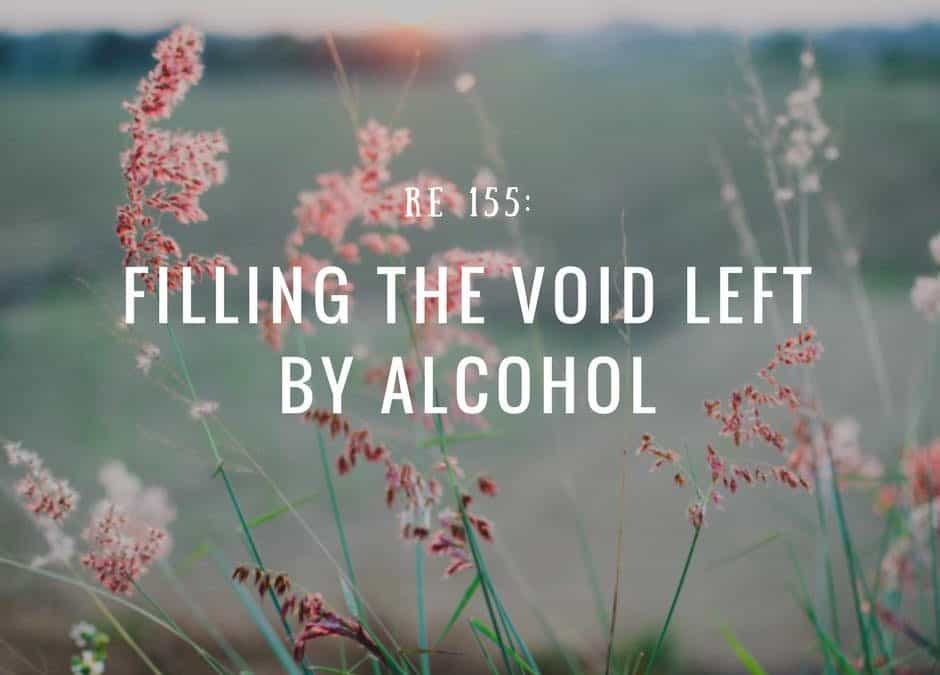
by Paul Churchill | Feb 5, 2018 | Podcast
Podcast: Play in new window | Download
Subscribe to the Recovery Elevator Podcast Apple Podcasts | | More
“For us to be successful in sobriety, we must fill the void left by alcohol.”
-Russel Brand, Recovery: Freedom from Our Addictions
Drinking plays a big role in our lives. Many of our social gatherings revolve around it. We use it to relax or to deal with difficult emotions. When we quit drinking, a void is then created that can be felt across many areas of our lives. What do we do with this? Should we fill it? With what?
When the void is present, some try to use willpower to ignore it or to muscle through or around it. Unfortunately, studies show that willpower is a finite resource and can not be solely relied upon to quit successfully. If the void (also known as the emotional and spiritual causes of alcoholism) isn’t properly dealt with, one can become what is known as a “dry drunk.” The behaviors, coping mechanisms, and mindsets of the alcoholic are still present; the only difference is the lack of alcohol consumption.
In sobriety, we find ourselves with more… more time, more energy, and more mental clarity. It’s important to fill this time and spend this energy in a healthy and productive way so that the reasons for the void’s existence begin to disappear as we lay a healthy and solid foundation for living. Find things you like to do, and more importantly, find the communities surrounding those activities and do your best to become a part of them.
Chrissy, with 2 and ½ years, talks about how she married her drinking buddy:
SHOW NOTES
[12:50] Paul Introduces Chrissy.
Chrissy has been sober for 2 and ½ years. She’s from Mill Valley, California. 48 years old. District Sales Manager. Mother of two teenage boys. She has two dogs. Married.
[14:42] When did you first realize you had a drinking problem?
She used to be in denial. She married her drinking buddy. Started dabbling to get out of her head. Became a problem when she moved to a town where everyone drank. Started drinking daily. Lead to a health scare.
[17:10] What was it like to find out you had Grade A Liver Cirrhosis?
She lost a lot of weight. She was mistaken for someone who was pregnant. Ignored swelling abdomen and yellow eyes. Eventually couldn’t ignore symptoms. The doctor called her an alcoholic. She says the doctor is a good place to go for help.
[20:50] Did you ever attempt to moderate or control your drinking?
She always tried to manage it. She had an idea for a perfect medium buzz. The health scare is what made her consider quitting.
[22:47] What was it like when you first quit?
It took a few weeks for her body to repair itself. She now gets checked up regularly.
[25:30] What did you learn about yourself during this process?
Once the fog was lifted, she began to ponder why she drank. Now she says it isn’t important. It’s more important to stay sober. Year 1 was “how do I stay sober?” and now year 2 is “how do I manage my emotions?”. Year 3 is now easier and more relaxing.
[27:10] What was it like to cut ties with alcohol completely?
She felt like she was kicking her best friend to the curb. She had to get it out of her immediate surroundings. At first, she felt sad, was white knuckling it. Now she feels that quitting drinking was the one thing that changed her life completely.
[31:17] What does a day in recovery look like for you?
A neighbor took her to a meeting. Found a sponsor. Podcasts. Reading books. Surrounding myself with sobriety. Changed her priorities.. recovery, then family, then work.
[33:25] What was it like to marry your drinking buddy?
She used to blame him a lot for her drinking. She noticed that he drinks less. They did therapy together. She’s focusing on herself. She’s not sure whether or not her husband is an alcoholic.
[36:00] What advice do you have for someone in recovery which is with someone who drinks?
Changed her perspective. Release me from the bondage of “self”. She focuses on herself. She sees her partner more with compassion.
[39:40] What do you have to say to a person who is scared of quitting because they feel they might become depressed?
Reach out and get some help. Any hospital will help you to quit drinking. Get to a safe place… get over the hump, just for a few days.
[42:20] Rapid Fire Round
- What was your worst memory from drinking?After delivering a baby, all she wanted to do was get home and have a drink.
- Did you ever have an “oh-shit” moment?When a colleague told her that her eyes were yellow.
- What’s your plan moving forward?Continue to stay in the middle of the herd. Continue to work with the sponsor, and keep going.
- What’s your favorite resource in recovery?Her community in recovery.
- What’s the best advice you’ve ever received (on sobriety)?“If your ass falls off, pick it up and come to a meeting.”
- What parting piece of guidance can you give listeners who are in recovery or thinking about quitting drinking?If you’re thinking about it, just go for it. If it’s not for you, you’ll know.
- You might be an alcoholic if…A worker at the grocery store mistakes your alcohol purchase as being for a large group of people.
Resources mentioned in this episode:
Recovery: Freedom from Our Addictions by Russell Brand
Connect with Cafe RE– Use the promo code Elevator for your first month free
Sobriety Tracker iTunes
Sobriety Tracker Android
Sober Selfies! – Send your Sober Selfie and your Success Story to info@recoveryelevator.com
“We took the elevator down; we gotta take the stairs back up, we can do this!”
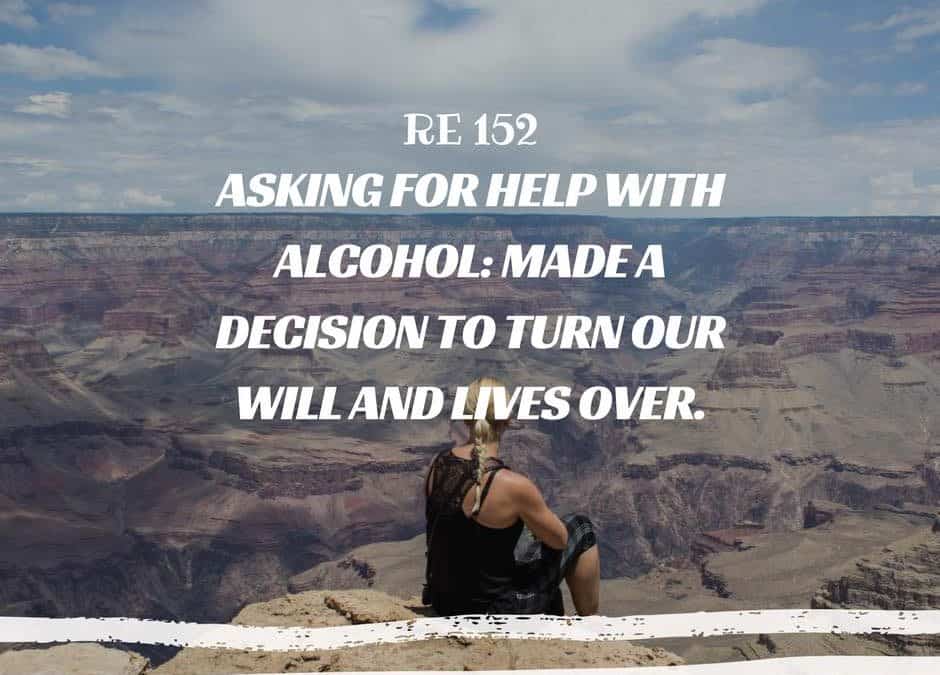
by Paul Churchill | Jan 15, 2018 | Podcast
Podcast: Play in new window | Download
Subscribe to the Recovery Elevator Podcast Apple Podcasts | | More
Paul summarizes Step 3 from the “Big Book” of Alcoholics Anonymous.
“Made a decision to turn our will and our lives
over to the care of God as we understood Him.”
Step three in a nutshell means we are asking for help. A God of our understanding can be anything. We must be convinced that a life run on self will can hardly be a success.
Jenna, with over 3 years since her last drink, shares her story
SHOW NOTES
[8:39] Paul Introduces Jenna. I live in Colorado, I work in IT, and I’m 38 and have a 10-year-old daughter. I love hiking, running, and skiing. I love to cook.
[12:38] Paul- When did you start drinking?
Jenna- I actually didn’t start drinking until I was in college. I didn’t drink in High School. The first time I drank I was 12. I discovered a bottle of alcohol, and poured it into a coke.
[21:25] Paul- What was it that led you to quit drinking?
Jenna- I had several bottoms before September of 2014. I knew alcohol wasn’t working for me, but no one knew that alcohol was the cause of my anxiety and depressing and feeling horrible.
[28:42] Paul- How liberating was it to be in that environment where your mom with nothing to hide?
Jenna- She cooked me lots of healthy food. It took me days to be able to eat. That love and being cared for was huge. She was there for me for whatever I needed.
[34:15] Paul- Talk to me about the timeline, and the patience. What do you have to say on that? It does keep getting better.
Jenna- That first year was amazing and hard at the same time. I had to learn how to do everything without alcohol in a culture where everything revolves around alcohol. Having accountability with my sponsor and my husband was huge in all of those times.
[43:21] Rapid Fire Round
- What was your worst memory from drinking? That would be when we were in Vegas for my Grandma’s 90th birthday party, and I took my daughter to the bathroom, and I got lost. I didn’t know how to get back to the restaurant and I was drunk.
- Did you ever have an “oh-shit” moment? Labor Day weekend of 2014. We were going camping. It was always my job to pack up the camper. I decided to drink before doing that, by the time we got out to the campsite 90% of what we needed was not in the camper.
- What’s your plan moving forward? I plan to keep growing personally and learning.
- What’s your favorite resource in recovery? What works for me is going to meetings, and connecting with other people.
- What’s the best advice you’ve ever received (on sobriety)? Surrender, and ask my higher power for help.
- What parting piece of guidance can you give listeners who are in recovery or thinking about quitting drinking? You can find your bottom at any time, just put down the shovel and quit digging (drinking).
- You might be an alcoholic if… when you are going through airport security your Ziploc bags of liquid shampoo bottles are filled with vodka.
Resources mentioned in this episode:
Alcoholics Anonymous “Big Book” PDF
Step 3 Pages 34-41
Connect with Cafe RE– Use the promo code Opportunity to waive the set up fee.
Sobriety Tracker iTunes
Sobriety Tracker Android
Sober Selfies! – Send your Sober Selfie and your Success Story to info@recoveryelevator.com
“We took the elevator down, we gotta take the stairs back up, we can do this!”
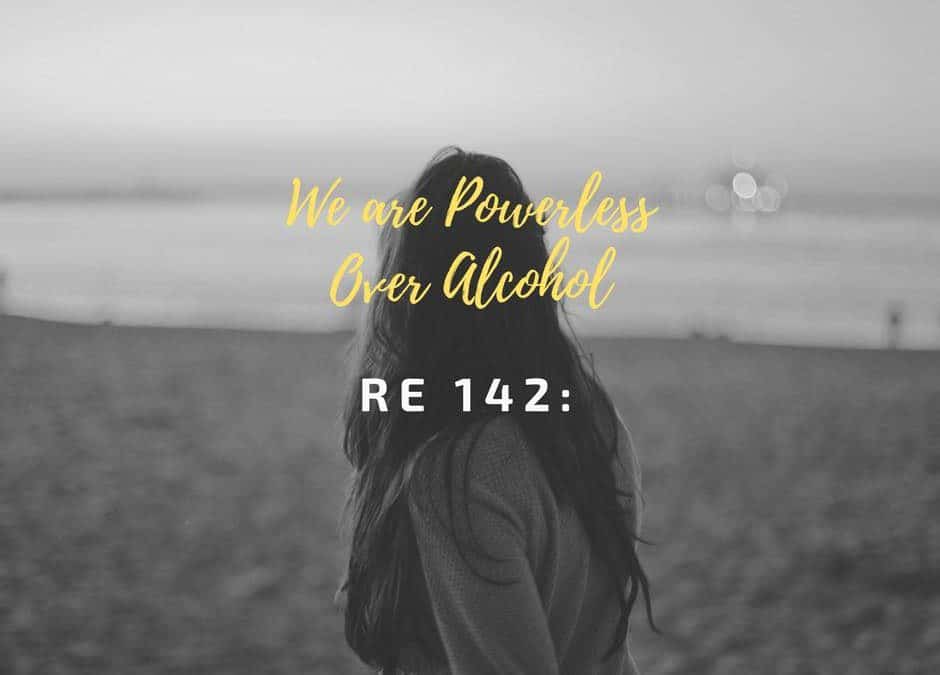
by Paul Churchill | Nov 6, 2017 | Podcast
Podcast: Play in new window | Download
Subscribe to the Recovery Elevator Podcast Apple Podcasts | | More
Paul discusses Step One: “ We admitted that we were powerless over alcohol, that our lives had become unmanageable.” from the Big Book of Alcoholics Anonymous.
David, with 46 days since his last drink, shares his story
SHOW NOTES
[10:20] Paul Introduces David. I’m a dad of 2 great boys aged 11, and 7. We live in Atlanta. I work at a software firm. I have been there for quite some time. I’m 42, and divorced. For fun there is a lot of baseball, I help coach basketball. Both my boys are in scouts. I love to play and collect guitars.
[12:52] Paul- When did you realize that perhaps you didn’t drink normal?
David- I have several memories of self-questioning my drinking habits going back a decade. I have milestones in my life I questioned my drinking.
[29:02] Paul- You are identifying yourself as a non-drinker. Have you experienced a different case of the F-its like I have 3 years of sobriety, F-it, I might as well keep moving forward?
David- I love this concept, I have not felt this feeling of you have come this far, you might as well keep going. I feel like that day is going to come. You have to be hopeful for the future. I am doing this. You have to balance that with healthy caution around relapse. I can be proud, I can be hopeful, but I have to be cautious.
[34:28] Paul- I know from the retreat you met a lot of people who have the same life goal, how has that affected you moving forward?
David- I described it when I started this journey. I didn’t have any tools. I had no institutional knowledge of what I was getting myself into. It was through your podcast I was introduced to AA in a meaningful way. What I learned from the retreat is that this is something where community helps.
[39:23] Rapid Fire Round
- What was your worst memory from drinking? You can insert any viscous hangover here. Missing a flight out of Vegas after a night of tearing it up. Head throbbing, and having to rearrange flights and childcare back in Atlanta while my head was throbbing.
- Did you ever have an “oh-shit” moment? When I figured out that the unit of measure was no longer 2 beers, it was a six-pack. No longer 3 glasses of wine, it was the entire bottle.
- What’s your plan moving forward? My number one internal dialogue is that I am no longer like that. I am no longer that person. It is almost a chant I give myself daily. I’m plugging back in with my therapist.
- What’s the best advice you’ve ever received (on sobriety)? While you’re working on your sobriety, your addiction is doing pushups.
- What parting piece of guidance can you give listeners who are in recovery or thinking about quitting drinking? Your litmus test is if you have you every asked yourself if you have a problem with alcohol, that is the test. I know I did that hundreds of times over a decade. Sick and tired of being sick and tired. The management of chaos we all endure as we introduce chaos into our evening routine.
- You might be an alcoholic if your favorite drink is “lots of it”
Resources mentioned in this episode:
Alcoholics Anonymous- Big Book
Connect with Cafe RE– Use the promo code Elevator for your first month free
Sobriety Tracker iTunes
Sobriety Tracker Android
Sober Selfies! – Send your Sober Selfie and your Success Story to info@recoveryelevator.com
“We took the elevator down, we gotta take the stairs back up, we can do this!”







